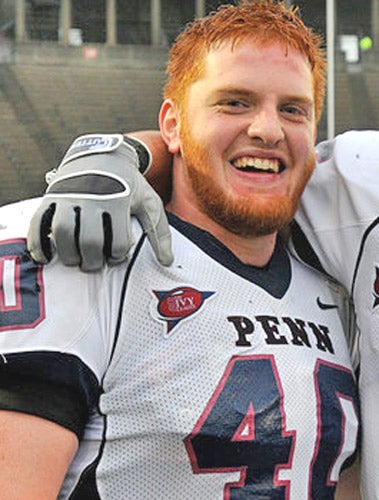American Football: Suicide of college player linked to sport's violent hits

Your support helps us to tell the story
From reproductive rights to climate change to Big Tech, The Independent is on the ground when the story is developing. Whether it's investigating the financials of Elon Musk's pro-Trump PAC or producing our latest documentary, 'The A Word', which shines a light on the American women fighting for reproductive rights, we know how important it is to parse out the facts from the messaging.
At such a critical moment in US history, we need reporters on the ground. Your donation allows us to keep sending journalists to speak to both sides of the story.
The Independent is trusted by Americans across the entire political spectrum. And unlike many other quality news outlets, we choose not to lock Americans out of our reporting and analysis with paywalls. We believe quality journalism should be available to everyone, paid for by those who can afford it.
Your support makes all the difference.The violence of gridiron football, with its macho culture and thunderous "hits" has long since helped the sport replace baseball as America's national pastime. But the suicide of a player from the University of Pennsylvania has raised a new fear – that the head injuries and concussions, now finally recognised as a major danger by the professional National Football League, are a big risk in hugely popular college and high school football as well.
Owen Thomas, at six foot two and weighing 17 stones, took his own life after a sudden and uncharacteristic bout of depression. Doctors subsequently found that his brain tissue displayed early signs of CTE, or chronic traumatic encephalopathy, a disease found among a disproportionate number of NFL veterans, and whose only known cause is repeated traumas to the head.
Thomas, according to the New York Times yesterday, is the youngest player, and the first amateur, diagnosed with CTE. And while specialists admit one case on its own – especially at colleges where suicides for other reasons are far from unknown – does not prove that CTE was the direct cause of his death, the circumstantial evidence is strong.
Every year, it is reckoned, more than 50,000 high school football players, aged between 14 and 18, suffer a concussion, which is especially dangerous when the brain is still growing. College players are at least as vulnerable, in a sport where no quality has been more admired than the ability to shrug off injury, even when that injury is a concussion, and play through pain.
Thomas was, by all accounts, a highly popular member of the team who had played three years at high school before going to UPenn, where he enrolled as an undergraduate in the university's prestigious Wharton School of Business.
As his mother told the NY Times, "he loved to hit people, he loved to go into practice and hit really hard... It's kind of sad. We all love football. We all love watching. We all love those great hits."
For years the NFL tried to play down the possibility those hits could cause brain damage. But events have forced it to accept that the jarring collisions that constitute so much of the sport's appeal can come at unacceptable cost, even for an industry whose star performers earn $10m (£6.5m) or more a year.
First, several studies showed that CTE and its ensuing mental disorders are disproportionately high among former NFL players. Then came the stunning news last December of the death of Chris Henry, a 26-year-old player for the Cincinnati Bengals, who played only five NFL seasons in the relatively "safe" position of receiver, who never suffered a concussion. But an autopsy found that he too suffered from CTE.
This season, for the first time, the posters, bluntly headlined "Concussion", were displayed in every team dressing room, urging players to report anyone they suspected might be suffering.
So popular is football here that it is unlikely to go the way of boxing, whose decline is inextricably linked to proof of brain damage. But the case of Owen Thomas underscores a risk that seems to run throughout the sport.
Join our commenting forum
Join thought-provoking conversations, follow other Independent readers and see their replies
Comments